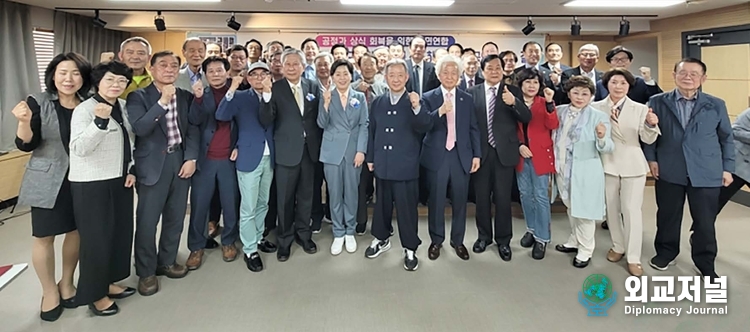By Reporter Lee Jun Suk

The "National Alliance for the Restoration of Fairness and Common Sense" has been advocating for solidarity and action towards hope and change by raising discourse on democracy, the rule of law, and restoring fairness and common sense in South Korea. On May 2nd at 3 pm, the 54th forum was held at the Seoul Bar Association building, inviting lawmakers to discuss the theme of "Becoming a leading science and technology powerhouse as a prosperous democratic country,"
Jeong Yong-sang, the permanent representative of Justice and Common Sense,said in his opening remarks, "Representative Yang Hyang-ja, who has led a success story with an unwavering belief in the semiconductor industry, which is the decisive foundation for Korea to become a top 10 economic power in the world, as well as the pioneer and witness of the Korean semiconductor industry and a true hero of this era who instills hope in young people, will not doubt that today's lecture will be a pan-national movement for desirable policy formulation to enhance the unparalleled international competitiveness of the semiconductor industry that will drive the Korean economy."
Representative Yang diagnosed the crisis situation of the domestic semiconductor industry due to the U.S.-China technology war and the U.S.'s attempts to restructure its own semiconductor supply chain centered on its own country and presented policy solutions.
Representative Yang said that Korea's semiconductor industry has become the core of the country's industry, possessing over 200 semiconductor-related listed companies, the world's top memory market share of 71.5% by domestic companies as of 2021, and the world's second-largest foundry. She also explained that in the U.S.-China technology dominance competition, the two countries now recognize the semiconductor industry as a national security industry and plan to invest 76 trillion won in the U.S. and 66 trillion won in China in semiconductor subsidies.
In particular, while the United States is trying to attract Korean companies through subsidies and tax incentives by seeking a semiconductor chip four-party alliance, Korea's political circle has perceived support for the semiconductor industry as a favoritism for certain large companies and has been parsimonious in fostering the semiconductor industry.
Secondly, the biggest issue in South Korea's advanced technology industry is securing technical talent. To cultivate advanced technology talent overflowing with creativity and a spirit of challenge and confidence, a shift in perception regarding the key factors of competitiveness is necessary, as demonstrated by Elon Musk, who has conquered satellite communications through entry into the space industry.
To achieve this, we need to find ways to create a virtuous cycle of start-up solidarity, including a shift in education and R&D systems through focused investment in "dominant technologies" and "inevitable industries," new immigration policies to utilize overseas personnel of domestic companies, securing science and technology talent through the world's 7.5 million overseas compatriots, and building a structure of solidarity for start-ups, such as the K-Diaspora (World Compatriot Unity) movement.
Thirdly, based on the promises made during the previous presidential and local elections, local governments in Gangwon Province and other regions are focusing their efforts on attracting semiconductor companies. It is suggested that, just as Saudi Arabia is pursuing transformation into an advanced industrial nation through the construction of Neom City, South Korea should not send its advanced companies overseas, but instead expand the semiconductor cluster in the capital region to make South Korea a platform country for the semiconductor advanced industrial cluster, thereby increasing the economic and strategic value of South Korea. It is proposed that the national government support the establishment of a semiconductor cluster, "K-Neom City."
Finally, Representative Yang quoted a passage from the "Nanjung Ilgi," a diary of a Korean scholar from the Joseon Dynasty, which states, "If one person guards the crossroads well, they can make a thousand people afraid." He emphasized that if there is even one person who can break away from conventional thinking and familiar ways of doing things, South Korea can progress and develop.
